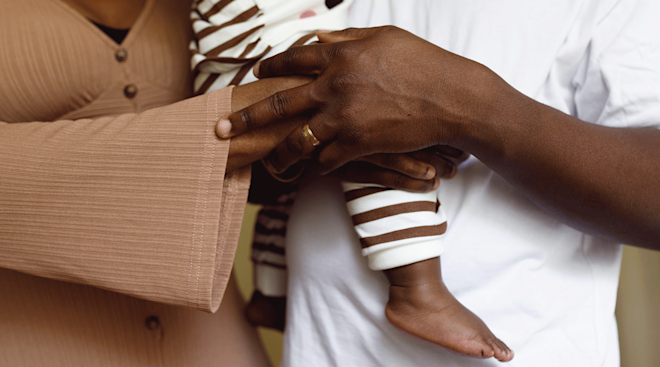Why It’s Normal (and OK!) to Hate Your Partner After Baby Comes
Maybe it’s the sound of your partner’s voice that suddenly gets under your skin, or the way they chew their food with their mouth open. (Why do they do that?) Or hey, maybe it’s their superior diapering skills that have you seriously on edge lately. Whatever it is, you’re not alone. Plenty of new parents suddenly find themselves taking some unexplained anger out on their partner. So what’s up with that? Read on to learn what might be going on.
From hormone changes to post-baby blues, there are plenty of reasons you might feel anger or resentment toward your partner during the postpartum period. “Between the hormonal storm, emotional upheaval, physical recovery, sleep deprivation, lack of self-care and realizing there’s no manual on how to care for a newborn, new moms ‘hate’ just about everyone around them, especially their partner,” says Sherry Ross, MD, an ob-gyn, author, and co-founder of Oneself Intimate Skin Care and the Women’s Health & Wellness School on the MprooV app. “It’s a completely normal, even expected, disruptive time caused by all the hormonal, emotional, mental and physical nuances and challenges.”
There’s also the fact that women are more often than not the “default parent,” meaning they take on the majority of parenting responsibilities, which can exacerbate resentment.
While it’s completely normal to get irritated at your partner during the stressful postpartum period, it’s obviously not ideal. If you find yourself snapping at your partner far too often, it might be time to look at what’s going on both physiologically and hormonally, says Shoshana Bennett, PhD, a clinical psychologist and maternal mental health expert. Here are a few tips from the experts on dealing with postpartum resentment:
Make sure to get enough sleep
You might scoff at the possibility of getting a night of solid, uninterrupted shut-eye in those first months, but don’t underestimate its power. “A good night’s sleep is a necessity, not a luxury,” says Bennett, who suggests having someone else watch baby while you get in some extra snooze time during the day or trading off night shifts with your partner to get a little more rest.
Make sure to hydrate
Believe it or not, dehydration not only causes irritability, but it also leads to anxiety. If you’re breastfeeding, you need to be extra careful to get in your daily eight cups of H2O. Get in the habit of keeping a glass of water nearby and sipping on it as baby nurses.
Eat a balanced diet
Even though you’re no longer pregnant, it’s still important to watch what you put in your mouth. You need to be getting enough protein and calcium. Also, be sure to sneak in some extra snacks throughout the day so you don’t become weak and cranky.
Don’t forget activities that make you happy
Try your best to schedule in time each week for things you enjoy. Meet up with friends so you don’t feel you’re losing touch, or de-stress by getting your nails done. Planning at least one thing each week that you can look forward to will help lift your spirits.
Talk things out with your partner—and get clear on expectations
“We’d like our partner to read our minds, but they can’t,” says Renée Goff, PsyD, PMH-C, a licensed clinical psychologist and owner of Orchid Wellness & Mentoring in Cincinnati, Ohio. “Discuss each of your expectations and provide concrete examples of what you’d like to see change or what would be more helpful.”
Make time for each other
“Remind yourself of why you fell in love with your partner. Maintaining connection is important,” Goff says. And keep in mind that “how you give and receive love may look really different than it did pre-baby and that’s alright!”
Remember to be empathetic
“Acknowledge that this is uncharted territory for both of you and you’re both learning to navigate it together,” Goff says. And while you’re at it, show yourself plenty of grace during this new and sometimes exhausting phase of life.
If you suspect you might have postpartum anxiety or postpartum depression—or just feel like you’d benefit from seeing a mental health professional—don’t hesitate to reach out to your healthcare provider. If you’re experiencing excessive worry, restlessness and irritability, feel uncontrollably sad, or are constantly irritated and angry, it’s important to speak with your doctor.
Finally, make sure to give yourself grace during this period. “I always tell my patients and their partners that it takes you nine months to go through the pregnancy process—allow yourself nine months during the postpartum process to have your body, mind and relationship with your partner get back on track,” says Ross. “Patience, time and communication is encouraged and recommended to ensure everyone weathers the postpartum storm in a loving way.”
Please note: The Bump and the materials and information it contains are not intended to, and do not constitute, medical or other health advice or diagnosis and should not be used as such. You should always consult with a qualified physician or health professional about your specific circumstances.
Plus, more from The Bump:
Shoshana Bennett, PhD, is a clinical psychologist and maternal mental health expert. She’s the executive producer of maternal mental health documentary Dark Side of the Full Moon and the author of several books on maternal mental health.
Renée Goff, PsyD, PMH-C, is a licensed clinical psychologist and owner of Orchid Wellness & Mentoring in Cincinnati, Ohio. She received her doctor of psychology from Wright State University in Dayton, Ohio.
Sherry Ross, MD, is an ob-gyn and women’s health expert at Providence Saint John’s Health Center in Santa Monica, California. She’s the author of She-ology: The Definitive Guide to Women’s Intimate Health. Period. and She-ology, the She-quel: Let's Continue the Conversation. She’s also the co-founder of Oneself Intimate Skin Care and the Women's Health & Wellness School on the MprooV app. She received her medical degree from New York Medical College.
Learn how we ensure the accuracy of our content through our editorial and medical review process.
Navigate forward to interact with the calendar and select a date. Press the question mark key to get the keyboard shortcuts for changing dates.




















































